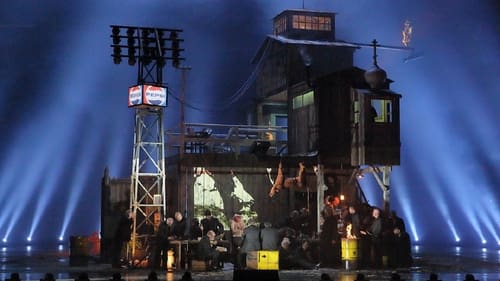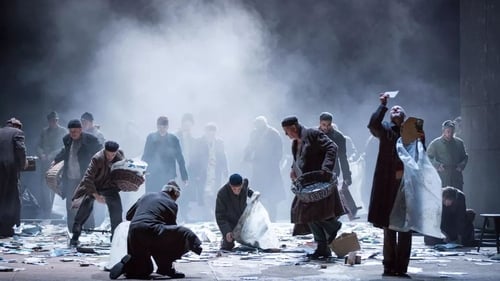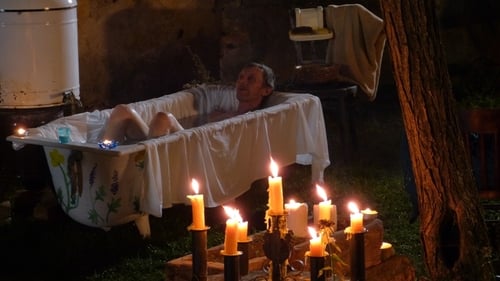
Music
A young woman in love with a composer is forced by her mother to take a rich suitor. When the two lovers are reunited years later, happiness is theirs for the taking, but a tragedy happens that changes everything. Robert Carsen’s premiere of Destiny opened the 2020 edition of the Janáček Brno Festival (International Opera Award winner 2019). It comprises some of Janáček’s most magnificent music, which sways from the peaks of romantic rapture to the depths of desperation and back again.

Original Music Composer
A non-narrative story based on Leoš Janáček's composition for a string orchestra.

Original Music Composer
When a beautiful young woman in rural Moravia becomes unexpectedly pregnant, she learns that love is sometimes only skin-deep. Janáček took Gabriela Preissová's grim tale of infanticide and redemption, and condensed it into a masterful, spine-chilling drama. The tragic plight of the protagonists is presented with unsentimental realism that cannot help but trigger a response of deep compassion. Premiered at the National Theatre in the composer's hometown of Brno 115 years ago, the opera took him nine years to complete and is the first in which his distinctive voice can clearly be heard.

Opera
When a beautiful young woman in rural Moravia becomes unexpectedly pregnant, she learns that love is sometimes only skin-deep. Janáček took Gabriela Preissová's grim tale of infanticide and redemption, and condensed it into a masterful, spine-chilling drama. The tragic plight of the protagonists is presented with unsentimental realism that cannot help but trigger a response of deep compassion. Premiered at the National Theatre in the composer's hometown of Brno 115 years ago, the opera took him nine years to complete and is the first in which his distinctive voice can clearly be heard.

Writer
Stage director Frank Castorf “might have been born to direct From the House of the Dead” (Opera Today). His gritty, visually striking adaptation brings bold modern and postmodern touches to Janáček’s masterwork without ever overshadowing the intense forward momentum of the music, conducted to dramatic perfection by Simone Young and sung by an all-star cast in Munich. Janáček adapted Dostoevsky for this powerfully compelling opera set in a Siberian prison camp, full of starkly contrasting moods and motifs, unusual in its episodic structure. The last opera Janáček ever composed, its third act was on his desk when he died in 1928; attempts by his students to “complete” his orchestration have largely fallen away over the decades in favor of the original version. Despite the grimness of the setting and the brutality of several characters, the composer’s compassion shines through in tender moments, movingly illustrating his motto for the work: “in every creature, a spark of God.”

Music
Stage director Frank Castorf “might have been born to direct From the House of the Dead” (Opera Today). His gritty, visually striking adaptation brings bold modern and postmodern touches to Janáček’s masterwork without ever overshadowing the intense forward momentum of the music, conducted to dramatic perfection by Simone Young and sung by an all-star cast in Munich. Janáček adapted Dostoevsky for this powerfully compelling opera set in a Siberian prison camp, full of starkly contrasting moods and motifs, unusual in its episodic structure. The last opera Janáček ever composed, its third act was on his desk when he died in 1928; attempts by his students to “complete” his orchestration have largely fallen away over the decades in favor of the original version. Despite the grimness of the setting and the brutality of several characters, the composer’s compassion shines through in tender moments, movingly illustrating his motto for the work: “in every creature, a spark of God.”

Writer
Condensing the life stories – memories of prison in Silesia – related by Dostoyevsky in his work The House of the Dead, Leoš Janáček composed an opera filled with burning desire and longing. Contagious savagery, cruelty and brutality are exacerbated by the confines of the prison. However, within its concrete walls emerge both tenderness and cruelty at the sight of an injured bird; a multitude of stories and highly personal monologues. With this production, first performed at the Wiener Festwochen in 2007, the Paris Opera pays tribute to Patrice Chéreau.

Original Music Composer
Condensing the life stories – memories of prison in Silesia – related by Dostoyevsky in his work The House of the Dead, Leoš Janáček composed an opera filled with burning desire and longing. Contagious savagery, cruelty and brutality are exacerbated by the confines of the prison. However, within its concrete walls emerge both tenderness and cruelty at the sight of an injured bird; a multitude of stories and highly personal monologues. With this production, first performed at the Wiener Festwochen in 2007, the Paris Opera pays tribute to Patrice Chéreau.

Original Music Composer

Original Music Composer
The tale of a quick-witted fox and her escape from confinement for a life in the forest.

Opera
The tale of a quick-witted fox and her escape from confinement for a life in the forest.

Music
In the forest, the animals and insects are playing and dancing. The Forester enters and lies down against a tree for a nap. A curious Vixen Cub inquisitively chases a frog right into the lap of the surprised forester who forcibly takes the vixen home as a pet. Time passes and we see the Vixen, now grown up into a young adult tied up in the forester's yard with the conservative old dachshund. Fed up with life in confinement, the vixen chews through her rope and runs off to freedom.

Writer
Set in a Siberian prison camp, Janacek's final opera centers on the experiences of recent arrival Alexandre Petrovitch Goriantchikov (Olaf Bar), a nobleman who finds relief from the harsh conditions in the friendship of the illiterate Alyeya (Eric Stoklossa). Recorded at the Grand Theatre de Provence, this stage production is directed by the well-respected Patrice Chereau and features famed conductor Pierre Boulez. Filmed at the Aix-en-Provence Festival on 20 July 2007.

Music
An adaptation of Leos Janacek's opera Prihody Lisky Bystrousky (1925), based on the novel Liska Bystrouska by Rudolf Tesnohlidek. It follows the life of Sharp-Ears, a fox who is captured by a forester as a cub and raised in his home prior to escaping back into the forest.

Music
One of several collaborative dance films by the Brothers Quay & (dancer, choreographer) William Tuckett. Little enough info around on line, but there's briefly by way of Wikipedia entry. Adapted rather loosely from the works of the E.T.A. Hoffman. Familiar Quays' tropes, much in evidence: automata, trompe l'oeil effects, etc. No credit on the sound design (which is fairly elaborate), tho' that is possibly Larry Sider.

Original Music Composer
A young, newly orphaned woman becomes the target of religious bigots when her individuality marks her as a pariah. This allegorical animated short from Klaas Rusticus explores the struggles of maintaining uniqueness in a world where the voice of the individual must be silenced. The 41-minute short is set to the provocative choral masterpiece "Glagolitic Mass" from composer Leos Janacek and performed by the City of Birmingham Symphony Orchestra.

Original Music Composer

Original Music Composer

Original Music Composer

Music

Opera

Music

Music

Music
Posthumously premiered in 1930, From the House of the Dead derives from Dostoevsky’s autobiographical 1862 novel that drew on his experience as a political prisoner in Siberia. Janáček focuses on Dostoevsky’s idea of the “spark of God” in every human being that has the potential to redeem even the most hardened criminal.

Music
Two neighbours. A lonely pianist on one side of the wall. A couple with domestic problems on the other. They can hear each other. THE NEIGHBOUR is a film about man and woman, about single people, about the chance to start over again, about chances that are long gone. It is also a film about how music affects us, and how we affect music. The film features dancers Line Tørmoen and Dimitri Jourde – two top level creative performers. It also features Leif Ove Andsnes – a pianist that should need no introduction to anyone interested in classical music. As one of the most accomplished musicians of the world he is constantly playing worldwide with solo recitals or accompanied by the most distinguished orchestras. His part in this project differs radically from his regular performances by the fact that his music interpretation is submitted motivations as a theatrical character. The location of the film was Jo Strømgren’s private flat in Oslo during a period in August 2009.















